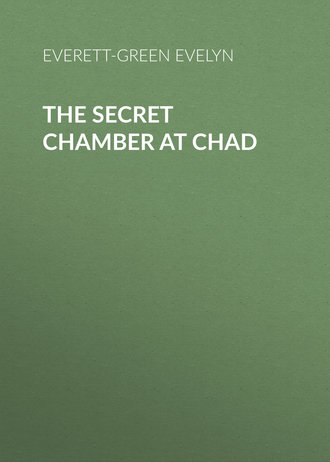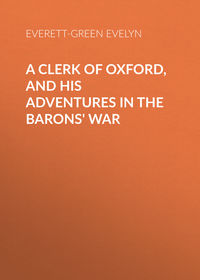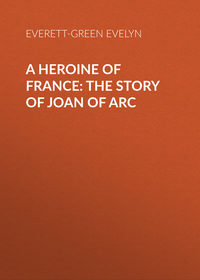 полная версия
полная версияThe Secret Chamber at Chad
Nurse never wearied of the tales told by her young masters, and listened with fond pride to the recital. So eagerly were Bertram and Julian talking, that they did not heed the sound of the horn at the gate way which bespoke the arrival of some messenger; but Edred slipped out to see who could be coming, and presently he returned with a frown upon his brow.
"There is a messenger at the gate who wears the livery of Mortimer," he said. "An insolent knave to boot, who flung his missive in the face of old Ralph, and spurred off with a mocking laugh. I would I had had my good steed between my knees, and I would have given the rascal a lesson in manners. I like not these messengers from Mortimer; they always betide ill will to my father."
Lady Chadgrove looked anxious for a moment, but her brow soon cleared as she made answer: "I shall be sorry if aught comes to grieve or vex your father; but so long as we are careful to give no just cause for offence, we need not trouble our heads overmuch as to the jealous anger of the Lord of Mortimer. I misdoubt me if he can really hurt us, be he never so vindictive. The king is just, and he values the services of your father. He will not permit him to be molested without cause. And methinks my Lord of Mortimer knows as much, else he would have wrought us more ill all these past years."
"He is a tyrant and an evil liver!" cried Bertram hotly; "and his servants be drunken, brawling knaves, every one-as insolent as their master. If I had been old Ralph, I would have hurled back his missive in his face, and bidden him deliver it rightly."
"Nay, nay, my son; that would but be to stir up strife. If others comport themselves ill, that is no reason why our servants should do the like. I would never give a foe a handle against me by the ill behaviour of even a serving man. Let them act never so surlily, I would that they were treated with all due courtesy."
Bertram and Julian hardly entered into their mother's feelings on this point; but Edred looked up eagerly, and it was plain that he understood the feelings which prompted the words, for he said in a low voice:
"Methinks thou art right, gentle mother; albeit I did sorely long to give the varlet a lesson to teach him better. But perchance it was well I was not nigh enough. Surely it must be nigh upon the hour for dinner. Our sport has whet the edge of appetite, and I would fain hear what the missive was which yon knave brought with him. Our father will doubtless tell us at the table."
It was indeed nearly noon, and mistress and maids alike relinquished their tasks to prepare for the meal which was the chiefest of the day, though the supper was nothing to be despised.
The long table in the great banqueting hall was a goodly sight to see when the dinner was spread, and the retainers of the better sort and some amongst the upper servants sat down with the master and his family to partake of the good cheer. At one end of the long board sat the knight and his lady side by side; to their right were the three boys, the young monk, and Warbel the armourer, who now held a post of some importance in the house. Opposite to these were other gentlemen-at-arms and their sons, who were resident at Chad; and at the lower end of the table, below the great silver salt cellars, sat the seneschal, the lowlier retainers, and certain trusted servants who held responsible positions at Chad. The cooks and scullions and underlings dined in the great kitchen immediately after their masters' meal had been served.
The table at Chad always groaned with good things, except at such seasons as the Church decreed a fast, and then the diet was scrupulously kept within the prescribed bounds. Sir Oliver and his wife were both devout and earnest people, and had every reverence for their spiritual superiors. The Benedictine Priory of Chadwater stood only a mile and a half distant, and the prior was on excellent terms with the owner of Chad. Brother Emmanuel had been an inmate of the priory before he was selected by Sir Oliver for the education of his sons. He was considered a youth of no small promise, and the knight was well pleased at the progress made by his boys since they had been studying with him.
Today there was a look of annoyance upon the handsome face of Sir Oliver Chadgrove. It was a striking countenance at all times, in which sternness of purpose and kindness of heart were blended in a fashion that was both attractive and unusual. He had the same regular features, rather square in the outline, which he had transmitted to his children; and his hair, which was now silvered with many streaks, had been raven black in its day. His carriage was upright and fearless, and he was very tall and powerfully proportioned. It was Bertram's keenest ambition to grow up in all points like his father, and he copied him, consciously and unconsciously, in a fashion that often raised a smile on his mother's face.
"I have been favoured with another insolent letter from my Lord of Mortimer," he said. "He had better take heed that he try not my patience too far, and that I go not to the king and lay a complaint before him. I will do so if I be much more troubled."
"What says he now, father?" asked Bertram eagerly, forgetting in his eagerness the generally observed maxim that the sons spoke not at table till they were directly addressed. But the knight did not himself heed this breach of decorum.
"It is the same old story; but every year he grows more grasping and more insolent. Today he complains, forsooth, that the last buck we killed was killed on his ground, and by rights belonged to him. He threatens that his foresters and huntsmen will wage war with us in future if we 'trespass' upon his rights, and wrest our spoil from us! Beshrew me if I submit to much more! Patience and forbearance are useless with such a man. I would I had not conceded all I have done in the interests of peace."
Bertram's face was crimson with anger, Edred's eyes had widened in astonishment, whilst Julian burst out in indignant remonstrance and argument.
"His ground! his rights! How can he dare say that? Why, the buck was killed at Juno's Pool; and all the world knows that that is within the confines of Chad, and that all forest rights there belong to the Lord of Chad! I would I could force his false words down his false throat! I would I could-" but the boy suddenly ceased, because he caught his mother's warning eye upon him, and saw that his father had opened his lips to speak.
"Ay, and he knows it himself as well as we do; but he is growing bolder and bolder through that monstrous claim he is ever threatening to push-the claim of his son-in-law to be rightful Lord of Chad! Phew! he will find it hard to prove that claim, or to oust the present lord. But Mortimer has money and to spare, and Chad has long been to him what Naboth's vineyard was to King Ahab-
"Brother Emmanuel, that simile is thine, and a right good one, too.
"He will seize on any pretext to pick a quarrel; and if he dares, he will push that quarrel at the point of the sword. I do not fear him; I have the right on my side. But we may not blind ourselves to this: that he is a right bitter and treacherous foe, and that should we give any, even the smallest cause of suspicion or offence, he would seize upon that to ruin us."
Sir Oliver looked keenly round the table at all assembled there, and many knew better than his sons what was in his mind at the time and what had caused him to speak thus.
For a long while now the leaven of Lollardism had been working silently in the country, and there were very many even amongst orthodox sons of the Church who were more or less "bitten" by some of the new notions. It need hardly be said that wherever light is, it will penetrate in a mysterious and often inexplicable fashion; and although there was much extravagance and perversion in the teachings of the advanced Lollards, there was undoubtedly amongst them a far clearer and purer light than existed in the hearts of those of the common people who had been brought up beneath the sway of the priests, themselves so often ignorant and ill-living men.
And so the light gradually spread; and many who would have repudiated the name of Lollard with scorn and loathing were beginning to hold some of their tenets, and to wish for a simpler and purer form of faith, and for liberty to study the Scriptures for themselves; and no one knew better the leavening spirit of the age than did Sir Oliver Chadgrove, himself a man of liberal views and devout habit of mind, and his wife, who shared his every thought and opinion.
They had both heard the stirring and enlightened preaching of Dean Colet, and were great admirers of his; but they took the view that that divine himself held-namely, that the Church would gradually reform herself from within; that she was awakening to the need of some reformation and advance; and that her sons were safe within her fold, and must patiently await her own work there.
This was exactly the feeling of the knight and his lady. They rejoiced in the words they had heard, and in the wider knowledge of the Scriptures which had been thus unfolded; but that any such doctrine, when preached and taught by the Lollard heretics, could be right or true they would have utterly denied and repudiated. The Lollards had won for themselves a bad name, and were thought of with scorn and contempt. Nevertheless, in country places the leaven of their teaching permeated far and wide, and Sir Oliver had more than once occasion to fear that amongst his own retainers some were slightly tainted by heresy.
Of course if it could be proved against him that his followers were Lollards, his enemy might take terrible advantage and deal him a heavy blow. It was the one charge which if proved would strike him to the earth; even the king's favour would scarce serve him then. The king would not stand up in opposition to the Church; and if the Church condemned his house as being a harbouring place for heretics, then indeed he would be undone.
It was this thing which was in his mind as he glanced with keen eyes round his table on this bright midsummer day; and his wife, and the monk, and the bulk of those sitting there read the true meaning of his words and of his look, and recognized the truth of the grave word of warning.
Chapter III: Brother Emmanuel
The hush of a Sabbath was upon the land. The sounds of life and industry were no longer heard around Chad. Within and without the house a calm stillness prevailed, and the hot summer sunshine lay broad upon the quiet fields and the garden upon which so much loving care had of late years been spent.
The white and red roses, no longer the symbols of party strife, were blooming in their midsummer glory. The air was sweet with their fragrance, and bees hummed drowsily from flower to flower. In the deep shadow cast by a huge cedar tree, that reared its stately head as high as the battlements of the turret, a small group had gathered this hot afternoon. The young monk was there in the black cassock, hood, and girdle that formed the usual dress of the Benedictine in this country, and around him were grouped his three pupils, to whom he was reading out of the great Latin Bible that was one of the treasures of Sir Oliver's library.
All the boys were Latin scholars, and had made much progress in their knowledge of that language since the advent of the young monk into the household. They had likewise greatly increased in their knowledge of the Scriptures; for Brother Emmanuel was a sound believer in the doctrine preached by the Dean of St. Paul's, and of the maxims laid down by him-that the Scriptures were not to be pulled to fragments, and each fragment explained without reference to the context, but to be studied and examined as a whole, and so explained, one portion illuminating and illustrating another. After such a fashion had Brother Emmanuel long been studying the Word of God, and after such a method did he explain it to his pupils.
All three boys were possessed of clear heads and quick intelligence, and their minds had expanded beneath the influence of the young monk's teaching. They all loved a quiet hour spent with him in reading and expounding the Bible narrative, and today a larger portion than usual had been read; for the heat made exertion unwelcome even to the active lads, and it was pleasanter here beneath the cedar tree than anywhere else besides.
"Now, I would fain know," began Julian, after a pause in the reading, "why it is that it is thought such a vile thing for men to possess copies of God's Word in their own tongue that they may read it to themselves. It seems to me that men would be better and not worse for knowing the will of God in all things; and here it is set down clearly for every man to understand. Yet, if I understand not amiss, it is made a cause of death for any to possess the Scriptures in his own tongue."
"Yea, that is what the heretic Lollards do-read and expound the Scriptures in the vulgar tongue and after their own fashion," said Bertram. "Have a care, Julian, how thou seemest to approve their methods; for there is a great determination in high places to put down at once and for all the vile doctrines which are corrupting all the land."
"I approve no heresy," cried Julian eagerly. "I do but ask why it be heresy to read the Word of God, and to have in possession a portion of it in the language of one's country."
"Marry, dost thou not know that one reason is the many errors the translators have fallen into, which deceive the unwary and lead the flock astray?" cried Edred eagerly. "Brother Emmanuel has told me some amongst these, and there are doubtless many others of which he may not have heard. A man may not drink with impunity of poisoned waters; neither is it safe to take as the Word of God a book which may have many perversions of His truth."
Edred looked up at Brother Emmanuel for confirmation of this explanation. It was the monk's habit to encourage the boys to discuss any question of interest freely amongst themselves, he listening in silence the while, and later on giving them the benefit of his opinion. All the three turned to him now to see what he would say upon a point that was already agitating the country, and was preparing the way for a shaking that should lead to an altogether new state of existence both in Church and State. Even out here in the garden, in the sanctuary of their own home, with only their friend and spiritual pastor to hear them, the boys spoke with bated breath, as though fearful of uttering words which might have within them some germ of that dreaded sin of heresy.
As for Brother Emmanuel, he sat with his hands folded in his sleeves, the great book upon his knees, a slight and thoughtful smile playing around the corners of his finely-cut mouth. His whole face was intensely spiritual in expression. The features were delicately cut, and bore the impress of an ascetic life, as well as of gentle birth and noble blood. He was, in fact, a scion of an ancient and powerful house; but it was one of those houses that had suffered sorely in the recent strife, and whose members had been scattered and cut off. He had no powerful relatives and friends to turn to now for promotion to rich benefice or high ecclesiastical preferment, and he had certainly never lamented this fact. In heart and soul he was a follower of the rules of poverty laid down by the founder of his order, and would have thought himself untrue to his calling had he suffered himself to be endowed with worldly wealth. Even such moneys as he received from Sir Oliver for the instruction given to his sons were never kept by himself. All were given either to the poor by his hands direct, or placed at the disposal of the Prior of Chadwater, where he had been an inmate for a short time previous to his installation as chaplain at Chad. He had not sought this office; he would rather have remained beneath the priory walls. He thought that it was something contrary to the will of the founders for monks to become parochial priests, or to hold offices and benefices which took them from the shelter of their monastery walls. But such things were of daily occurrence now, and were causing bitter jealousy to arise betwixt the parochial clergy and the monks, sowing seeds of strife which played a considerable part in the struggle this same century was to see. But it was useless to try to stem the current single-handed, and the rule of obedience was as strong within him as that of poverty and chastity.
When sent forth by his prior (who secretly thought that this young monk was too strict and ascetic and too keen-witted to be a safe inmate of a house which had long fallen from its high estate, and was becoming luxurious and wealthy and lax), he had gone unmurmuringly to Chad, and since then had become so much interested in his pupils and in his round of daily duties there that he had not greatly missed the life of the cloister.
He had leisure for thought and for study. He had access to a library which, although not large, held many treasures of book making, and was sufficient for the requirements of the young monk. He could keep the hours of the Church in the little chantry attached to the house, and he was taken out of the atmosphere of jealousy and bickering which, to his own great astonishment and dismay, he had found to be the prevailing one at Chadwater.
On the whole, he had benefited by the change, and was very happy in his daily duties. He rejoiced to watch the unfolding minds of his three pupils, and especially to train Edred for the life of the cloister, to which already he had been partially dedicated, and towards which he seemed to incline.
And now, eagerly questioned by the boys upon that vexed point of the translated Scriptures and their possession by the common people, he looked thoughtfully out before him, and gave his answer in his own poetic fashion.
"The Word of God, my children, is as a fountain of life. Those who drink of it drink immortality and joy and peace passing all understanding. The Saviour of mankind-Himself the Word of God-has given Himself freely, that all men may come to Him, and, drinking of the living water, may find within their hearts a living fountain which shall cause that they never thirst again. But the question before us is not whether men shall drink of this fountain-we know that they must do so to live-but how they shall drink of it; how and in what manner the waters of life shall be dispensed to them."
The boys fixed their eyes eagerly upon him. Julian nodded his head, and Edred's eyes grew deep with the intensity of his wish to follow the workings of the mind of his instructor.
"For that we must look back to the days of our Lord, when He was here upon earth. HOW did He give forth the Word of Life? How did He rule that it was from that time forward to be given to men?"
"He preached to the people who came to Him," answered Edred, "and He directed His apostles and disciples to do likewise-to go forth into all lands and preach the gospel to every creature."
"Just so," answered Brother Emmanuel, with an other of his slight peculiar smiles. "In other words, he intrusted the Word-Himself, the news of Himself-to a living ministry, to men, that through the mouths of His apostles and those disciples who had received regular instruction from Him and from them the world might be enlightened with the truth."
The boys listened eagerly, with mute attention.
"Go on," said Edred breathlessly. "Prithee tell us more."
"Our blessed Lord and Master laid no charge upon His apostles to write of Him-to send forth into the world a written testimony. We know that the inspired Word is written from end to end by the will of God. It was necessary for the preservation of the truth in its purity that its doctrines should be thus set down-that there should be in existence some standard by which in generations to come the learned ones of the earth might be able to judge of the purity of the doctrines preached, and refute heresies and errors that might and would creep in; but it was to men, to a living ministry, that our Saviour intrusted the precious truths of His gospel, and to a living ministry men should look to have those truths unfolded."
"I see that point," cried Edred eagerly. "I had never thought of it quite in that way before. Does it so state the matter anywhere in the Holy Book? I love to gather the truth from its pages. Thou hast not told us that we are wrong in that."
"Nay, under guidance all men should seek to those holy truths; but will they find the priceless jewel if they seek it without those aids our blessed Lord Himself has appointed? Wouldst thou know more of His will in this matter? Then thou shalt."
The monk turned the leaves of the book awhile, and then paused at an open page.
"On earth, as we have seen, the blessed Saviour intrusted His truth to the care of chosen men. Now let us see how He acted when, ascended into the heavens, He looked down upon earth, and directed from thence the affairs of this world. Did He then ordain that a written testimony was to be prepared and sent forth into all lands? No. What we learn then is that when He ascended into the heavens and received and gave gifts to men, He gave to them apostles, prophets, evangelists, pastors, and teachers-a living ministry again, a fourfold living ministry-that by this living ministry, surely typified in the vision of St. John by the four living creatures with the fourfold head, the saints were to be perfected, the unity of the faith preserved, and the body of Christ edified and kept in its full growth and perfection till He come Himself to claim the Bride."
Edred's eyes were full of vivid intelligence. He followed in the Latin tongue the words as Brother Emmanuel spoke them, and looking up he asked wistfully:
"But where are they now, the apostles and prophets, the evangelists and pastors? Have we got them with us yet?"
"We have at least the semblance of them; doubtless but for our own sins and shortcomings we should have a fuller ministry-a fuller outpouring of the water of life through those four God-given channels by which the Church is to be fed. We have the apostolic office ever in exercise in our spiritual head at Rome. St. Peter has left us a successor, and his throne shall never be empty so long as the world lasts. Now and again the prophetic fire bursts forth in some holy man who has fasted and prayed until the veil betwixt the seen and the unseen has grown thin. Would to God there was more light of prophecy in the earth! Perchance in His grace and mercy He will outpour His Spirit once again upon the earth, and gather about his Holiness a band of men lighted by fire from above. In our wandering friars, ever going forth to the people with the word of the gospel, we have the office of evangelist in exercise; and the priest who guides the flock and dwells in the midst of the people of the land, surely he is the pastor, the keeper of the sheep. And thus we see that our blessed Saviour's gifts to men have been preserved all through these long centuries, and are still amongst us in greater or less degree; and we can well understand that having given us these channels, by which His vineyard is to be watered, by which the living waters are to flow forth, it is not His will that every man should be his own evangelist or pastor, feeding himself at will, drinking, perhaps to surfeit, of the precious waters which should be conveyed to him through the appointed channel, but that he should be under dutiful obedience and submission, and that thus and thus only may unity and peace be preserved, and the body grow together into its perfect stature and fullness."
"I see all that exactly," cried Bertram, "and I will strive to keep it in mind. I mislike the very name of Lollard, and I well know that they be a mischievous and pernicious brood, whom it were well to see exterminated root and branch. Yet no man can fail to see that they love the Scriptures, and I felt they were in the right there. Now I well see that they may love the Word as much as they will, but that they must still seek to be taught and fed by those who are over them in the Church, and not seek to eat and drink (in the spiritual sense of the word) at their own will and pleasure. That is truly what the Church has ever taught, but I never heard it so clearly explained before.
"Come, Julian; the sun is losing much of its power now. Let us stroll along the margin of the stream, and see where best we may fish upon the morrow.
"Edred, wilt thou come? No; I thought not. Thou art half a monk already. We will leave thee with Brother Emmanuel to talk more on these hard matters. I have heard enough to satisfy me, I shall never want to turn Lollard now. The name was always enough, but now I see more and more clearly how wrong-headed and wilful they be."









